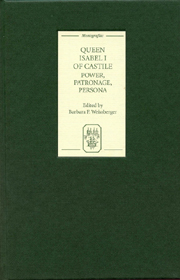Introduction: “Questioning the Queen, Now and Then”
Published online by Cambridge University Press: 12 September 2012
Summary
Hasta la Reina Isabel beaila el danzón is the title of a brief documentary made by Cuban filmmaker Luis Felipe Bernaza in 1991. The striking title is actually the first line of the estribillo, or refrain, of a well-known danzón, a Cuban dance rhythm popular during the first half of the twentieth century: “Hasta la Reina Isabel baila el danzón, porque es un ritmo muy suave y sabrosón” [Even Queen Isabel dances the danzón, because it's a very smooth and delicious rhythm]. Bernaza's comic documentary is structured around a series of interviews, most extensively with Marta González Paret, a palm and card reader and santera. Marta is also a spiritualist: she claims that since the age of twelve she has channeled the spirit of Queen Isabel I of Castile. When questioned about the current accessibility of the Queen, Marta is not encouraging. Unlike the African spirits, she explains, the Spanish queen is not an “espíritu de labor” [hardworking spirit] who can be summoned through prayer and ritual.
Despite the uncertainty of making contact with the monarch, the interviewer takes to the streets of Havana to ask people whether or not they believe in spirits, and if so, what questions they would ask Queen Isabel's spirit if she were to appear. Most of the men and women interviewed answer the first question positively and know exactly who Queen Isabel is, even if they are not aware that she is being considered for sainthood.
- Type
- Chapter
- Information
- Queen Isabel I of CastilePower, Patronage, Persona, pp. xi - xxivPublisher: Boydell & BrewerPrint publication year: 2008



